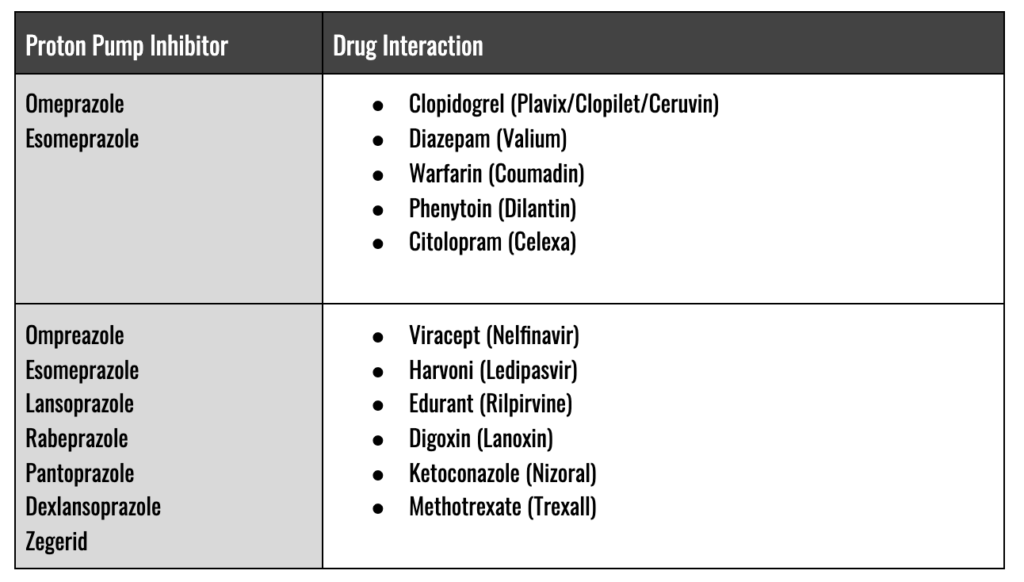Last Updated November 18, 2020
Proton Pump Inhibitors (PPIs) are drugs that limit the production of digestive acid in the stomach wall. They work by disrupting key enzymes which in turn prevent certain cells in the stomach lining from pumping acid. PPIs are available both by prescription and in over-the-counter (OTC) formats.
While PPIs have proven very useful for the treatment of chronic maladies such as Gastroesophageal Reflux Disease (GERD), patients should be aware that they also have the potential to interact with certain other common medications. Accordingly, PPI users should consult with their physician about what other types of medication or supplements they take in order to reduce the possibility of adverse reactions.
PPIs and Common Drug Interactions
Omeprazole, perhaps one of the most commonly prescribed and purchased PPIs on the market is believed to interact with at least 194 drugs on the market today. Of these interactions, at least 16 are believed to be serious, 132 are thought to be moderate and 46 are minor.

Omeprazole (Prilosec) and Esomeprazole (Nexium) Interaction with Clopidogrel
Clopidogrel (brand names: Ceruvin, Clopilet, and Plavix) is an anti-clotting medication that is commonly prescribed for patients suffering from heart disease or who are at increased risk for heart attack and stroke.
Clopidogrel’s effectiveness as an anti-clotting agent is frequently accompanied by one very common side effect: it causes significant disruption of the lining of the stomach and intestines. Sometimes this disruption can also increase the risk of gastrointestinal bleeding. Furthermore, doctors may also prescribe an aspirin regimen alongside clopidogrel, especially after placement of an arterial stent. Since clopidogrel and aspirin both have issues with excess stomach acid, physicians would commonly prescribe PPIs such as omeprazole and esomeprazole to patients to help ease this side effect.
Unfortunately, most PPIs, and in particular omeprazole and esomeprazole, stall the production of an enzyme known as “CYP2C19” that is critical to the body’s ability to metabolize clopidogrel. Consequently, the U.S. Food and Drug Administration (FDA) issued a warning in 2009 asking patients taking clopidogrel to avoid omeprazole and esomeprazole.
PPIs and Alcohol Consumption
Alcohol, in particular red wine and distilled spirits such as tequila, rum, and whiskey, are frequent culprits that trigger heartburn or other symptoms associated with GERD. The effect of alcohol on heartburn can be doubled or worse by combining alcohol with caffeine-boosted beverages.
People who suffer from heartburn or GERD frequently turn to OTC medications such as antacids, H2 blockers (Pepcid, Tagamet, Zantac, and Axid), and PPIs. Although there are no clear drug interactions between PPIs and alcohol use, it should be noted that the impact of PPIs can be lessened by excessive alcohol consumption. Furthermore, PPIs can mask other conditions such as gastric ulcers which can be exacerbated by excessive alcohol consumption.
Sources Cited (12)
1) “Pharmacokinetic Drug Interaction Profiles of Proton Pump Inhibitors: An Update” https://www.ncbi.nlm.nih.gov/pmc/articles/PMC3975086/
2) “Proton Pump Inhibitors (PPIs)” https://www.medicinenet.com/proton-pump_inhibitors/article.htm
3) “Proton Pump Inhibitors: Considerations With Long-Term Use” https://www.uspharmacist.com/article/proton-pump-inhibitors-considerations-with-longterm-use
4) “Proton-pump inhibitors” https://www.health.harvard.edu/diseases-and-conditions/proton-pump-inhibitors
5) “Patient Tips Omeprazole: 7 things you should know” https://www.drugs.com/tips/omeprazole-patient-tips
6) “How 8 Common Medications Interact with Alcohol” https://www.livescience.com/41703-how-common-medications-interact-alcohol.html
7) “The prophylactic use of a proton pump inhibitor before food and alcohol” https://pubmed.ncbi.nlm.nih.gov/12641517/
8) “Treating Heartburn and Gastro-Esophageal Reflux (GERD): Using Proton-Pump Inhibitors (PPI) carefully” https://choosingwiselycanada.org/heartburn-gerd-ppi/
9) “Omeprazole Drug Interactions” https://www.drugs.com/drug-interactions/omeprazole-index.html?filter=3
10) “Drug Interactions between Celexa and omeprazole” https://www.drugs.com/drug-interactions/celexa-with-omeprazole-679-335-1750-0.html#:~:text=omeprazole%20citalopram&text=Talk%20to%20your%20doctor%20before,be%20serious%20or%20life%2Dthreatening.
11) “Is it safe to mix alcohol with heartburn medication?” https://www.singlecare.com/blog/alcohol-and-heartburn-medication/
12) “5 drug-food interactions to beware” https://www.mdlinx.com/article/5-drug-food-interactions-to-beware/2uHOrk9z7pNfK6fITT03xl



